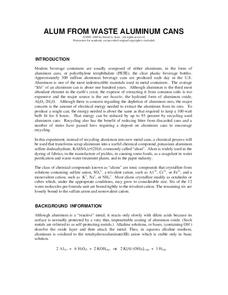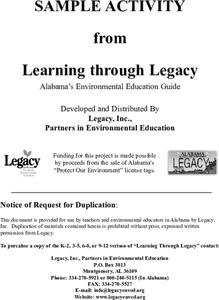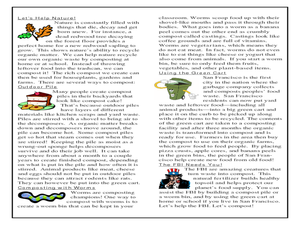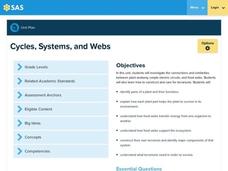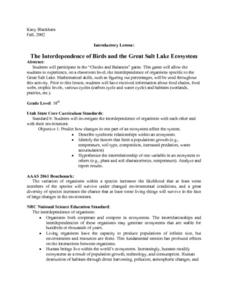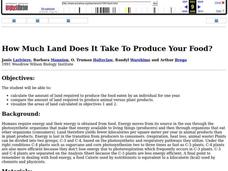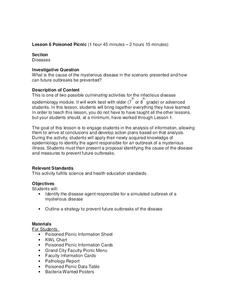Curated OER
Gallery Walk Questions on Weathering and Mass Wasting
A set of questions on weathering and erosion are found in this resource. Some of them can be used as discussion topics or lecture guides. There are also suggested activities such as the examination of topographic quadrangles and the...
Curated OER
Life Science- Useful Waste
Fourth graders explore the topic of waste and recycling. In this useful waste lesson, 4th graders classify objects and sort them into most usable and least usable categories. Students complete an activity sheet and have a discussion on...
Curated OER
Food Chains, Food Webs, Biomass Pyramids and Cycle
In this food chains worksheet, students complete a crossword puzzle by placing 16 terms into the puzzle that match the clues given. Students review food webs, biomass pyramids, and the water cycle.
Curated OER
Garbage in the Garden
Students create their own compost. In this soil lesson, students fill a bag with waste and soil, in order to create a mini compost bin. Students observe the baggies over a 6 week period, they record their findings and collect data on...
Curated OER
Urban Ecosystems 4: Metabolism of Urban Ecosystems
Cities are compared to living, breathing, metabolizing organisms. Fourth in a five-part series of lessons, this one focuses on the flow of materials through a city. Links to interesting websites and images make your delivery of...
Chymist
Alum from Waste Aluminum Cans
Turn aluminum cans into pickles! An engaging experiment has learners chemically change aluminum into a substance with many purposes including the manufacture of pickles. After performing the chemical conversion, the experimenters verify...
Curated OER
Slash Trash! Reducing, Reusing and Recycling Our Way to Zero Waste
The other "Three Rs" are covered in this instructional activity: reduce, reuse, and recycle. Over four weeks, conservationists collect data about waste in their own homes. They combine their findings with those of other students in order...
Curated OER
How Long Until Dirt
Third graders examine the difference between composting and wasting food. They problem-solve what to do about leftovers after lunches so good food doesn't go to waste.They study food storage techniques that are environmentally friendly...
Curated OER
Molehill or Mountain
Students explore the concept of waste management. In this environmental stewardship lesson, students consider the trash generated by people per day and discuss what steps they can personally take to reduce waste.
Curated OER
Garbage Pizza
Young scholars examine amount of garbage disposed of by average household weekly, classify different categories of garbage and describe composition of landfills, investigate what happens to waste after it is collected by garbage trucks,...
Curated OER
Food Chains, Food Webs, Biomass Pyramids and Cycle
In this food chain worksheet, students review terms associated with food chains and food webs. Students also recall the water cycle.
California Academy of Science
Our Hungry Planet: Design Thinking Challenge
Scholars investigate an issue associated with food systems and design their own solutions. Working collaboratively, they follow each step in the design process to complete the 10th lesson of the 13-part Our Hungry Planet series.
Curated OER
Waste Minimization and Protecting the Environment
Learners study the amount of waste produced and its effects on the environment. They discuss food, money, and energy and how their waste effects others. They read a play to explore how waste is produced and create a collage of...
Curated OER
Let's Build a Worm Bin
Students explore the process of decomposition. For this ecology and measurement lesson, students prepare a worm home to be used for vermicomposting. Students weigh a group of worms and the added food, recording this information on a data...
Curated OER
TE Activity: Trash Talkin'
Young scholars collect and categorize solid waste produced in the classroom. They weigh the waste that has been collected over one week's time, and separate it into recyclable and non-recyclable waste. They talk about the role of...
Curated OER
Pollution and Marine Life
In this pollution and marine life activity, students use 9 given terms related to types of pollution and ocean food chains to complete sentences. Students number the effects of human sewage and soil runoff that harm ocean organisms in...
Pennsylvania Department of Education
Cycles, Systems, and Webs
Fourth graders review the parts of the plant and their functions. In this plant lesson, 4th graders recognize that plants must transfer energy to make food. Students understand the interdependence of organisms in an ecosystem.
Curated OER
Oh, What a Tangled Web We Weave
Fifth graders investigate the food chain by viewing video clips. In this food web lesson, 5th graders investigate populations and ecosystems by viewing a video in class as well as visiting web sites. Students utilize the Internet to...
Curated OER
The Interdependence of Birds and the Great Salt Lake Ecosystem
Tenth graders participate in the "Checks and Balances" game. This game lets them experience the interdependence of oragnisms specific to the Great Salt Lake. They recieved informaton about food chains, food webs, trophic levels various...
Curated OER
From Eggs to Frogs
Third graders receive a small container of tapioca pudding, they are to pretend that it is frog eggs. The students pretend they are birds who see the eggs, and eat some of them. They discuss what would happen if these were really frog...
Curated OER
How Much Land Does It Take To Produce Your Food?
Students calculate the amount of land required to produce the food eaten by an individual for one year. They compare the amount of land required to produce animal versus plant products. Students visualize the areas of land calculated.
Curated OER
Solid Waste Recycling
Students seek scientific and technological solutions to envrionmental problems. They record class activities in a journal. They identify relationships among living things and their environments.
Centers for Disease Control and Prevention
Poisoned Picnic
A group of teachers attended a picnic; ten became sick and another four died. Young scholars must solve the mystery of what happened. They research the river, waste water treatment plant, each food that was served, and environmental...
Curated OER
Waste, Then and Now
Students discuss and compare the waste disposal habits of today with those of Native Americans of long ago.
Other popular searches
- Science Project Food Waste
- Recycling Food Waste
- Food Waste Decomposers
- School Food Waste
- Food Waste Decompose Rs







